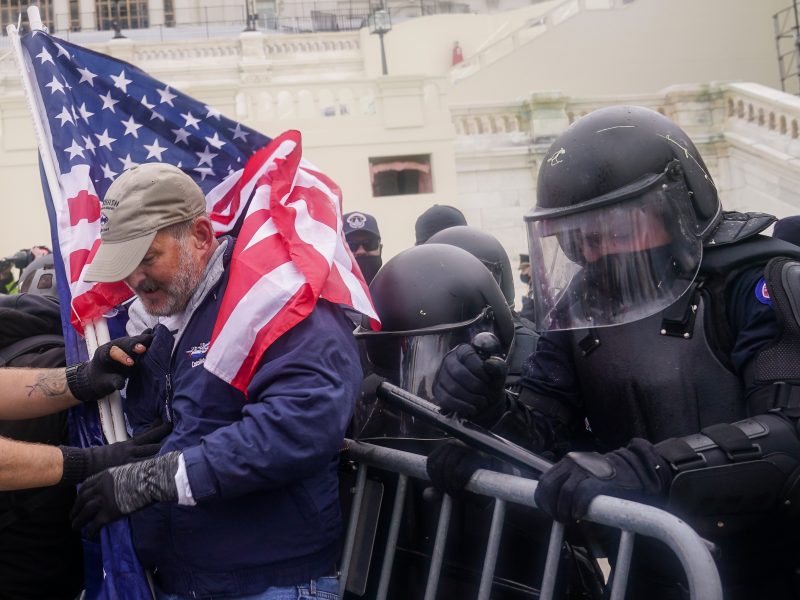An audience member at CNN’s town hall with Florida Gov. Ron DeSantis (R) managed to accomplish something on Thursday evening that has often proved elusive over the past year: identify a subject on which DeSantis was willing to distance himself from Donald Trump.
Ronald Langel, introduced by host Kaitlan Collins, asked DeSantis to define the term “patriotism.” He offered an example to evaluate: “Did the January 6th insurrectionists display patriotism as some of them claim they did?”
“No. Of course not,” DeSantis replied. “I mean, that was not a good day for the country.”
He went on a bit, first disparaging how “the left” and “the media” have “politicized” the Capitol riot, as though the events of that day were otherwise removed from politics. But that immediate response, that rejection of the idea that the rioters were engaged in patriotic acts, is telling — both about him and about Trump.
Langel framed the question in a way that presented the riot participants themselves as identifying their actions as patriotic. Some have. But so have prominent Republican elected officials, including Rep. Paul A. Gosar (R-Ariz.) and Donald Trump himself. Campaigning in New Hampshire last April, he hugged a woman who had recently been released from prison after being sentenced for her participation in the riot. Trump lamented that the treatment of the Jan. 6 “patriots” was “so bad.”
This is not a universal sentiment among Republicans or Trump supporters, but it’s not a particularly unusual one. Polling released last year by the University of Massachusetts at Amherst, conducted by YouGov, shows that about 1 in 6 Americans think that “patriot” is a good descriptor for those who participated in the events at the Capitol, with that number jumping to 3 in 10 among Republicans.
Republicans were only slightly more likely to describe the participants as “rioters.” Overall, Americans were twice as likely to describe the participants as “terrorists” rather than “patriots.”
Asked how they would describe what unfolded at the Capitol on Jan. 6 in general, Republicans surveyed in a January 2022 CBS News poll (also conducted by YouGov) were more likely to describe the riot as “patriotism” than “an insurrection.” About half of Republicans used the former term. And that was two years ago; Washington Post polling released this week shows that support for riot participants has grown over time.
These numbers are also interesting given how Langel framed his question, describing those who participated as “insurrectionists.” Only 1 in 10 Republicans used that term in the U-Mass. Amherst poll, but DeSantis didn’t object to Langel’s use of it. Support for describing the rioters as “patriots,” though, is low enough that DeSantis — historically attuned to the temperature of the right’s online conversations — didn’t hesitate to reject it. And, by extension, to reject Trump’s framing.
There’s a reason that Trump is inclined to say that he views riot participants as patriots. Even if he didn’t actually think they were, it’s useful for him personally to describe them as victims of overzealous, anti-American prosecutors. After all, he has relentlessly tried to frame his own prosecutions in the same way; by hyping the idea that Jan. 6 rioters are docile American patriots, he can present federal charges as a universal response to those who share his philosophy, rather than as an obvious response to his own actions.
But Trump probably actually does see the protesters as patriots. After all, Trump’s view of patriotism and America mirrors Louis XIV’s apocryphal assessment of France: L’etat, c’est moi. I am the state and it is me. To be a patriotic American is to support Donald Trump — which the rioters very much were doing.
The CBS poll included a follow-up question for those who described the events of Jan. 6 as patriotism: Why did they think that? Nearly two-thirds said it was because they were “standing up for Trump.” This is also why Trump would not be inclined to view the rioters as “insurrectionists”: They were defending America in his view, which is to say, defending him.
This presentation by Trump is long-standing. During his presidency and, particularly during the 2020 election campaign, he presented the resources of the presidency as his own and framed the election as an effort to strip him of his rightful power. Then, of course, he battled the results of the election he lost, leading to the events at the Capitol.
DeSantis obviously doesn’t view the presidency that way and, therefore, isn’t willing to state that the riot was somehow a demonstration of patriotism. Many Republicans are skeptical of the term, however sympathetic they might be to the rioters’ desired outcome. And the Florida governor clearly doesn’t share Trump’s view that Trump is the natural, legitimate possessor of the presidency.
Unfortunately for DeSantis, far more Republicans see Trump as the natural choice for president in 2025 than see him that way.

